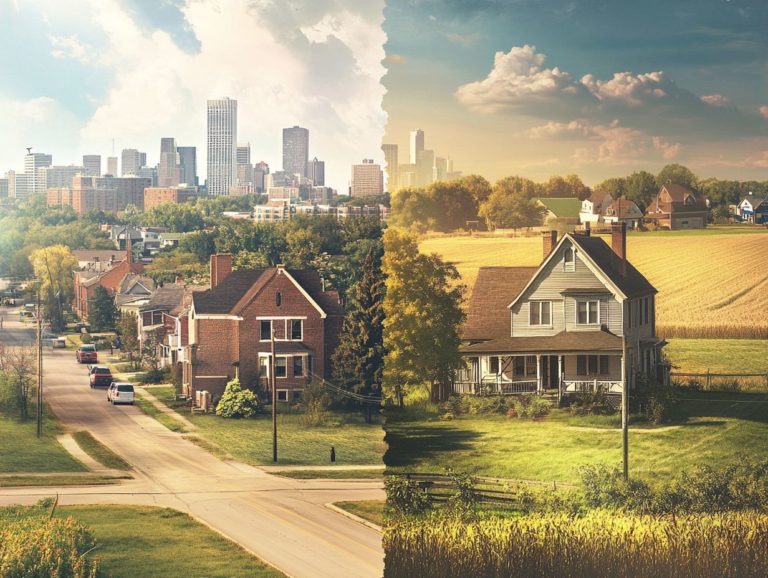Understanding the Role of Home Insurance Providers
Home insurance is essential for protecting your most valuable asset your home.
But what exactly does it cover, and how do you select the right provider?
This guide breaks down what home insurance covers and how to choose a provider. It explores different types of providers you might encounter.
Key factors to consider in your decision-making process are highlighted, along with clarifications of common misconceptions. Understanding the benefits of home insurance is crucial for your peace of mind.
Whether you re a first-time homeowner or contemplating a switch in providers, this information empowers you with the knowledge necessary for making informed decisions.
Contents
- Key Takeaways:
- What is Home Insurance?
- Types of Home Insurance Providers
- Factors to Consider When Choosing a Provider
- Benefits of Having Home Insurance
- Common Misconceptions about Home Insurance
- Frequently Asked Questions
- What is the role of home insurance providers?
- What factors affect my home insurance coverage and costs?
- What are some common types of coverage offered by home insurance providers?
- Do home insurance providers offer coverage for natural disasters?
- Can homeowners customize their coverage with home insurance providers?
- What should I consider when choosing a home insurance provider?
Key Takeaways:

Understand what home insurance is and what it covers to protect your home and belongings from unexpected events.
Compare different insurance companies based on cost, coverage, and reputation to find the right provider for your needs.
Home insurance protects your finances and offers peace of mind in case of emergencies or accidents, debunking common misconceptions about its importance.
What is Home Insurance?
Home insurance, often called homeowners insurance, is a crucial policy designed to protect you from money problems related to damage to your residence.
This policy usually includes various coverage options, such as protection against property damage, personal liability, and additional living expenses if your home becomes uninhabitable due to unexpected events.
Homeowners insurance not only protects the physical structure of your home; it’s also a necessity often required by mortgage companies for those financing their properties.
Definition and Coverage
Homeowners insurance provides financial protection against risks that could jeopardize your home and its contents.
This type of insurance typically includes coverage for dwelling protection, safeguarding the physical structure of your home, and personal property insurance to protect belongings like furniture and electronics.
It often features personal liability protection, guarding you from legal claims or lawsuits that arise from accidents on your property.
You must know specific exclusions that may limit your coverage, such as damages caused by floods or earthquakes these often require additional policies.
Understanding the terms of your insurance policy is vital because these details profoundly influence the level of financial support available during unforeseen disasters.
Types of Home Insurance Providers
You have many options when it comes to home insurance providers, from large, well-established companies to niche mortgage firms.
This variety gives you the power to choose coverage that aligns with your specific needs.
Comparing Insurance Companies

When comparing insurance companies, consider factors like insurance premiums, coverage options, and the efficiency of the claims process. This evaluation goes beyond just numbers; it includes diving into customer reviews for invaluable insights into policyholder experiences.
Understanding a company’s financial stability is also key, as a reliable insurer is more likely to honor claims on time. Pay attention to how quickly and effectively a company responds during the claims process; this reveals their commitment to customer satisfaction.
By obtaining multiple quotes from different insurers, you can compare their offerings comprehensively. This also ensures you grasp the specifics of homeowners insurance policies, including deductibles, exclusions, and endorsements.
Factors to Consider When Choosing a Provider
Selecting the ideal home insurance provider requires careful evaluation of various elements, such as cost, coverage options, and the company s standing within the industry.
Each of these factors plays a crucial role in ensuring you make a well-informed decision that suits your unique needs.
Cost, Coverage, and Reputation
The cost of homeowners insurance can fluctuate significantly based on your chosen coverage options, geographical location, and the reputation of the insurance companies you consider.
This variability arises from various factors that you need to weigh carefully when selecting the right policy. For instance, if you live in an area prone to natural disasters, you might find that your insurance costs are higher than those of homeowners in more stable regions.
The condition of your home is another critical aspect. Well-maintained properties typically qualify for lower rates, as insurers view them as lower risk.
You can also enhance your insurance situation by seeking out multiple policy discounts, ensuring you bundle your home and auto insurance for added savings.
Additionally, taking proactive steps, such as installing security systems or upgrading your plumbing and electrical systems, can lead to reduced premiums, further demonstrating your commitment to effective risk management.
Benefits of Having Home Insurance
Home insurance provides significant advantages, chiefly financial protection against unforeseen losses, damage to your property, and personal liability.
This coverage ensures that you can maintain peace of mind during challenging times, allowing you to navigate uncertainties with confidence and security.
Financial Protection and Peace of Mind

One of the primary benefits of homeowners insurance lies in the financial protection it offers, granting you peace of mind as you rest easy knowing your property and belongings are well safeguarded.
Think of this coverage as your safety net, ready to catch you during life s unexpected falls! This coverage serves as a safety net during unexpected crises, such as natural disasters, theft, or fire damage, which can leave you feeling vulnerable and anxious.
With the assurance that a safety net is in place, you can approach stressful situations, like dealing with property damage claims, with newfound confidence.
Different policies can cater to your unique needs. For instance, comprehensive plans not only cover the physical structure of your home but also protect the personal belongings inside. Liability coverage protects you if someone gets hurt on your property.
This personalized support eases the emotional stress of homeownership, reinforcing the idea that in times of distress, you are never truly alone.
Common Misconceptions about Home Insurance
You might encounter several common misconceptions about homeowners insurance that can create misunderstandings about coverage, damage exclusions, and insurance rates.
It s essential to navigate these beliefs carefully to ensure you fully understand your policy and its implications.
Debunking Myths and Misunderstandings
Debunking myths surrounding homeowners insurance is crucial for you to make informed decisions about your coverage options and truly understand the limitations of your policies. Many individuals harbor misconceptions that could lead to inadequate protection or unnecessary expenses.
For example, a prevalent myth is that homeowners insurance automatically covers flood damage; in reality, such coverage usually demands a separate policy. You might also think that your personal belongings are fully protected under any circumstance, but many policies impose limits on valuables.
Consulting with insurance companies can help clarify these nuances, giving you the power to select the right coverage tailored to your unique situation while steering clear of the pitfalls that can arise from misunderstanding standard policies.
Frequently Asked Questions
What is the role of home insurance providers?

The main role of home insurance providers is to offer financial protection to homeowners in the event of unexpected damage or loss to their property. This can include coverage for damages due to natural disasters, theft, and accidents, but it’s also important to understand the role of underwriting in home insurance.
What factors affect my home insurance coverage and costs?
Home insurance providers determine coverage and costs based on several factors, including the location and value of the home, the homeowner’s claims history, and the level of coverage and deductible chosen by the homeowner. The deductible is the amount you pay out of pocket before insurance kicks in.
What are some common types of coverage offered by home insurance providers?
Home insurance providers typically offer several types of coverage. This includes dwelling coverage for your home’s structure and personal property coverage for belongings inside.
Do home insurance providers offer coverage for natural disasters?
Yes, many providers cover natural disasters like hurricanes, earthquakes, and wildfires. Always check your specific policy to ensure it protects against risks in your area.
Can homeowners customize their coverage with home insurance providers?
Absolutely! Homeowners often customize their insurance by adding coverage for valuable items like jewelry or artwork.
They can also adjust their deductible, which is the amount paid out of pocket before coverage kicks in, and set their coverage limits to fit their needs and budget.
What should I consider when choosing a home insurance provider?
When selecting a home insurance provider, consider their reputation and customer service ratings.
Look at the coverage options, premiums, and the company’s financial stability. Always compare quotes from multiple providers to find your best fit.






